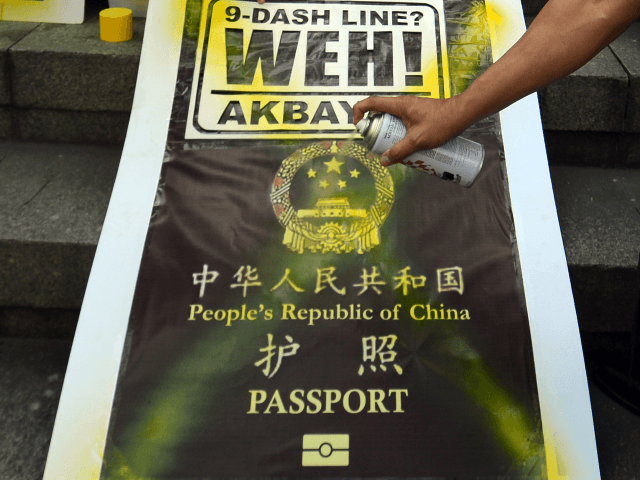A spokesman for Philippine President Rodrigo Duterte announced on Tuesday that the passports of Chinese visitors will soon be stamped with a map of the Philippines, prominently including islands in the South China Sea claimed by both Manila and Beijing.
Asked if the new passport policy was intended as a means of reminding Chinese visitors that the Philippines disputes China’s control of the islands, spokesman Salvador Panelo said simply, “Yes.”
The Philippine Inquirer recalled this sort of thing happening before, saying:
In 2012, the Philippines, under then-President Benigno S. Aquino III, introduced the policy of stamping Philippine Visas on the application forms of visiting Chinese nationals instead of marking it on their passports. This move was in protest of the image imprinted on the e-passports of Chinese travelers showing Beijing’s nine-dash line that covers almost the entire South China Sea, including areas within Philippine territory.
China is notoriously peevish about such challenges to its expansive territorial claims. In May 2018, the Gap clothing store was compelled to apologize to China for selling a T-shirt that depicted a silhouette of China without including Taiwan, southern Tibet, or all of the islands in the South China Sea claimed by Beijing.
Philippine officials are considering much more substantial measures than snarky passport stamps. Voice of America News noted on Sunday that plans have been floated to build hotels on Thitu Island in the Spratly chain as a means of countering Chinese expansion, along with a few “military structures” to protect the hotels.
Thitu is currently inhabited by about a hundred people, so hotels would represent a substantial change to the island’s lifestyle. The island was the scene of a confrontation between the Philippines and China this spring when hundreds of Chinese fishing boats, some of them crewed by armed “maritime militia” forces, surrounded it and blocked Filipino fishermen from accessing their favored fishing grounds.
The Philippines condemned China’s fishing flotilla as a means of annexing the island. Constructing hotels and developing tourist resources would make it difficult for China to take the island without committing an overt act of war, and could also buttress Manila’s legal case for “actual control and use” of the land, although China has been perfectly willing to ignore international court cases that do not go its way.
Duterte reportedly intends to bring up the arbitration ruling China has been ignoring when he meets with Chinese Communist Party leader Xi Jinping during a visit to China later this month. According to his spokesman Salvador Panelo, Duterte long ago warned Xi that he would eventually want to hold a frank discussion of competing South China Sea territorial claims along with the terms of cooperative mineral and oil exploration agreements, and Duterte has decided the time has come for that discussion since his term in office will end soon.
Panelo said Duterte will also talk to Xi about the Recto Bank incident, which occurred on June 9 when a Chinese ship rammed a Filipino fishing boat. Philippine investigators announced in July that the Chinese vessel was primarily at fault for the collision while admitting the Filipino crew also made some mistakes due to their lack of formal maritime training.
Panelo said Duterte will ask Xi to hold the Chinese crew members involved in the incident accountable and compensate the Filipino fishermen for their losses. Duterte might also ask Xi to withdraw some of the Chinese ships that have been swarming around contested islands in the South China Sea to reduce tensions and lower the chances of another collision.

COMMENTS
Please let us know if you're having issues with commenting.